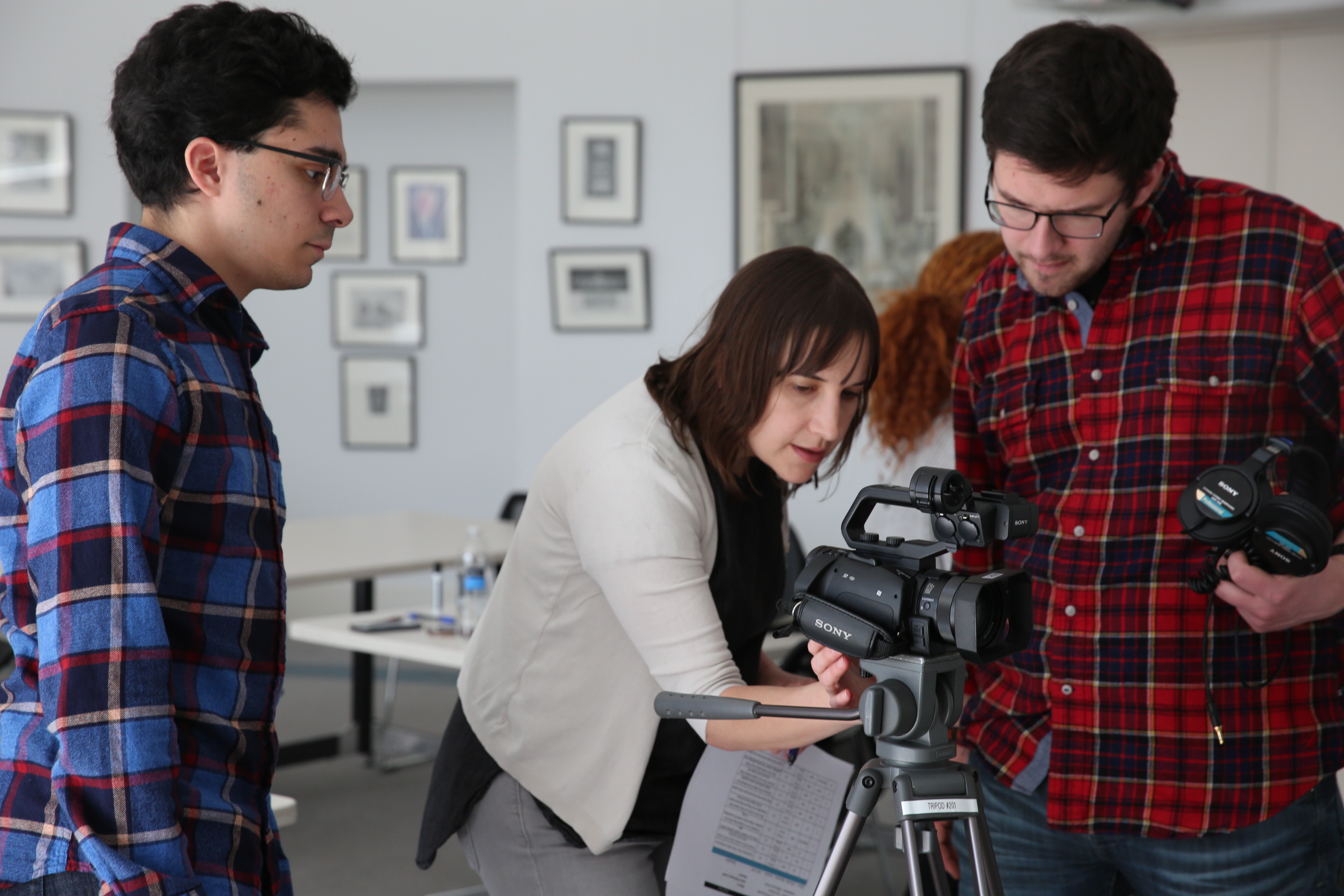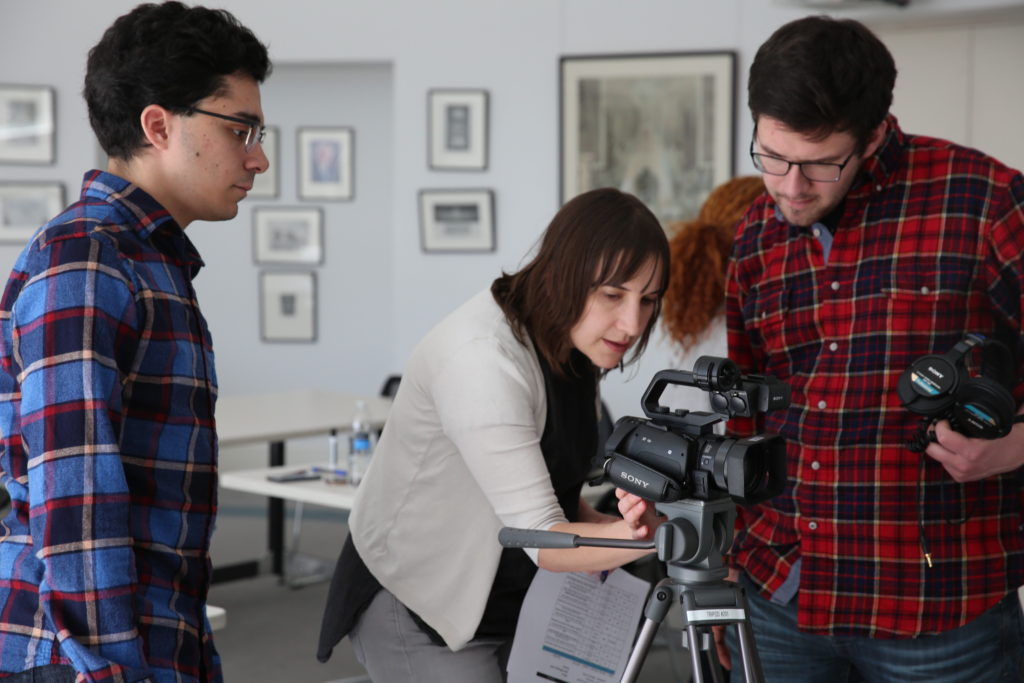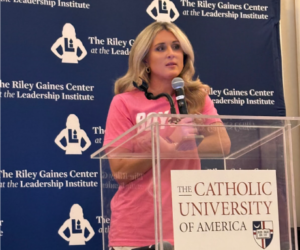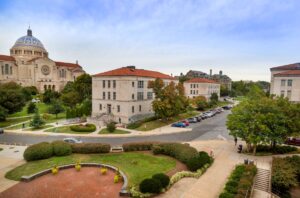“Academic Renewal” Proposal to Consolidate Departments, Eliminate Faculty

Media professor Maura Ugarte works with junior production students. Courtesy of Abby Moser.

The Benjamin T. Rome School of Music, the Departments of Art, Drama, and Media and Communication Studies will be consolidated into a new School of Music, Visual, and Performing Arts in the fall of 2018, according to a pending academic proposal submitted by the Office of the Provost.
The proposal, titled “Academic Renewal,” also calls for the elimination of approximately 35 full time faculty in different schools and departments, either voluntarily or involuntarily. In a newsletter sent to faculty on March 9th, University Provost Andrew Abela shared an outline of the plan, citing the school’s need to “be more attractive to current and prospective students by strengthening the quality of the student experience, while at the same time containing costs.” The first resolution of the proposal would move the aforementioned departments into a new conglomerate school, while taking selected faculty from each unit with it. The proposed changes aim to cut costs and save $3.5 million from reduced academic expenses.
In a March 14th email from the office of the Provost, students in the departments of Art, Drama, and Media and Communication Studies were invited to meet with Abela “to talk about some proposed changes in [their] departments.”
Later that day, Dr. Stephen McKenna, chair of Media & Communication Studies, after speaking with several media students who were confused about the significance of this meeting, sent an email out to all media majors strongly encouraging them to attend. In this email, he shared some of the relevant changes to the department in the Academic Renewal proposal, including the termination or departure of three of its five full-time faculty members and the shift to join with the art department.
Many negative reactions followed from students, current and past, who cited concerns about the value of their degrees, possible changes to curriculum, and fears that their department would cease to exist next fall. There was even a change.org petition asking to keep the department as-is that had amassed more than 630 signatures at the time this was written. McKenna noted that he was criticized by some administrators for sending the explanatory email to his students, but made the decision to do so after asking himself what he would want a chair to do if one of his college-aged daughters were invited to such a meeting.
“The answer would be to share information as best as I have it. So I’ve been criticized for doing that, but perhaps I have a different opinion on the ethics of communication,” McKenna said. “The students deserve to know ahead of that meeting.”
Abela told The Tower in a phone interview that these moments of unease and frustration are exactly why he will host meetings with students involved in these department changes.
“The whole purpose is to serve our students well and serve them better,” Abela said. “So people have ideas on how to improve or change things, and that’s exactly why I wanted to meet them.”
A copy of the provost’s newsletter and the entire 18-page proposal was later made available to students and anyone interested on the university’s website and via a schoolwide email from the Student Government Association (SGA), after significant requests for clarification came from the university community, on social media especially.
Abela highlighted the intention that no programs or courses would be cut as a result of the renewal project, and added that faculty personnel would be affected after teaching loads were adjusted.
“We’re maintaining all the majors, not changing the names of any of the majors of any degrees, not changing the number of courses and sections offered, none of that is changing,” Abela said. “Whatever you signed up for when you came in, it’s what you will continue to get.”
The proposal in its current form may need adjusting then, as the resolution states all programs in the existing Department of Art and Department of Media and Communications Studies will be moved to “the new Department of Art and Communications in this new school,” for example. One main concern from students and faculty alike proposed that a program fused with Art in a performing arts school heavily taught by adjunct instructors should not be considered something they signed up for.
McKenna believes this combination does not make sense from an academic standpoint.
“From an enrollment perspective, students seeking a degree in communications or a media type field, first of all, don’t go looking for them in schools of the arts,” McKenna said. “There are some bachelor’s of comm arts, but communication arts usually indicates something quite different from the kind of media-literacy focused, humanities education we deliver in this department.”
One of the main objectives in the Academic Renewal Proposal is the goal of enhancing the university’s reputation as a research institution, an effort that it hopes could increase annual grant funding and bring significant revenue improvements in the long run. It also describes the efforts made up to this point in cutting costs to avoid the reduction of faculty positions. Abela acknowledged that a main factor for the proposal is the same problem other universities are currently facing: increased competition in higher education and enrollment revenue challenges that come with it.
“This means that we have to simultaneously continue to strengthen the quality of what we offer, while at the same time reining in costs,” Abela said. “It is difficult to do both of those things at the same time, but we think this proposal does that, which is why we are bringing it forward.”
In terms of a timeline, the proposal will be reviewed and voted upon by the Academic Senate, a group comprised of administrators and professors from a variety of majors and disciplines. That group met this past Thursday, March 15th, and will meet twice again in April and May, before a final vote from the university’s Board of Trustees on June 5th. If passed, the proposal’s changes would be implemented immediately for the 2018 fall semester. In between the Senate sessions, the plans will be reviewed by other committees and presented to affected student groups for feedback. One such student meeting will take place Wednesday, March 21st at 12 PM in the Pryzbyla Center Great Room.
Link to Academic Renewal Summary
Contact Academic Senate/SGA Representatives for the full 18-page proposal.








I’m highly disappointed in such a move. These are some of the top schools and to alter them in any way would be hurting students, faculty and the University’s focus.
Why are you killing the Benjamin T. Rome School of Music after just recently celebrating its 50th anniversary? This is just wrong.
This sounds catastrophic to me! I’d hate to see the drama and music programs at CUA gutted in the way this seems to propose … they’re outstanding programs, and their graduates WORK. The faculty that I know there, in both of those departments, are profoundly capable educators and first-rate arts professionals … if any of their positions were to be eliminated that would be a tragedy.
The mention of revenue, money, occurs more frequently than quality or academic focus.